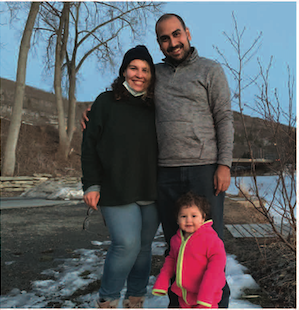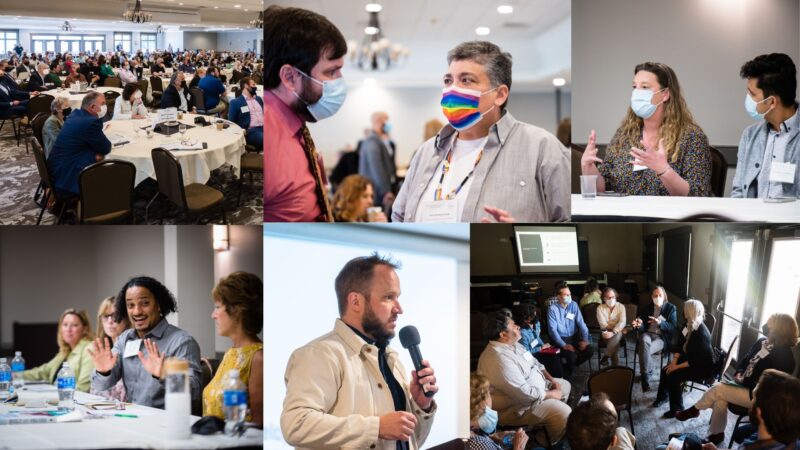
Home sweet home: Family from Puerto Rico lands in Brattleboro
Pictured above, the Melendez family when they first arrived in Vermont in 2020, with the help of BDCC’s Welcoming Communities programs.
By Chris Mays, Brattleboro Reformer
To read the original article which includes a video and photo essay by Kristopher Radder, please visit https://www.reformer.com/local-news/home-sweet-home-family-from-puerto-rico-lands-in-brattleboro/article_09917980-a3fb-11ed-8270-03258cc05f78.html
BRATTLEBORO — Strong support from an unofficial welcoming party proved to be crucial for a family new to the United States.
Adriana Negron and her husband Eduardo Melendez were born and raised in Puerto Rico. After Hurricane Maria hit the island hard in 2017 and the COVID-19 pandemic further disrupted life, they decided to seek a new place to live.
“It felt like those years come together because of how difficult it was for a while,” Negron said. “We had the hurricane then we had earthquakes then we had the pandemic. It was like the most difficult time of our lives.”
Melendez, a photojournalist now employed by Ethiopian Community Development Council in Brattleboro, documented traumatic experiences and all the wreckage on the island. The couple felt powerless and created art installations to protest what was happening.
“Everything was destroyed and nothing worked and politicians were just doing photo ops while we had people dying in their homes because they didn’t have a way to refrigerate their insulin, and families with children with special needs were staying in mud-covered schools, my father lost his home during the hurricane and it was one of the most heart-wrenching experiences and then the political unrest because of how many people they let die,” Negron said.
Negron became pregnant with her third child, her first with Melendez, and COVID came along right after the birth. The couple lost their jobs just before Christmas and had no money to constantly replenish their fridge when food would inevitably rot due to power outages. Prices for food, rent and utilities kept rising. Melendez found a job that didn’t pay enough to support the family.
When they couldn’t feed their children, the couple found themselves in the most stressful situation of their lives.
“We were so desperate and we knew there was a better way for our children,” Negron said.
They also wanted to get out of the public school system in Puerto Rico when the oldest child was being taught religion in school. So they began searching online for different places and states.
Vermont appeared to them to be inviting to BIPOC (Black, Indigenous, People of Color) and accepting of LGBTQ (lesbian, gay, bisexual, transgender and queer) individuals, with plenty of space and clean air to breathe.
“We wanted to have a beautiful life,” Negron said.
The couple submitted their information to a website and they received a call from staff at Brattleboro Development Credit Corp. They were told about schools and job opportunities but also warned about the housing crisis.
They liked how they were treated by Casey Haynes, former talent specialist and coordinator of the Southern Vermont Young Professionals program at BDCC who now works at Northern Border Regional Commission, and Jennifer Stromsten, director of programs at BDCC. They ended up visiting Brattleboro, which Negron described as a small town that is “so different” from Puerto Rico, in March 2021.
Although they felt completely out of their element, Negron said, “everyone was so inviting and helpful and so willing to have us be part of the community.”
Negron recounted walking into Everyone’s Books and bumping into owner Nancy Braus. When the family had difficulties finding housing, Braus took down their contact information and offered to help.
“And she did,” Negron said, as Braus reached out to everyone she knew and eventually connected the couple with Angie Dodd, who was willing to a make her three-bedroom home with a basement available for them. “It was like a huge house and she just decided she wanted to rent it to us.”
Negron said Dodd told the couple their children deserved a good start in life and wanted to help them. They expect to close on the deal in April.
“That was amazing,” Negron said. “She didn’t know us. We didn’t have amazing credit or anything like that but she trusted us.”
Community members who didn’t know the family dropped off boxes of food when they first arrived and had difficulty paying for groceries. Mara Williams, curator at the Brattleboro Museum & Art Center, “basically adopted our kids” and spends a lot of time ensuring the children are doing well, Negron said. “Mara was like, ‘You belong here.’”
When the family noticed their 3-year-old had a developmental delay, the Winston Prouty Center for Child and Family Development sent over someone to evaluate the child the day after Negron called and gave him treatment at no cost.
“People just helped us no questions asked,” Negron said.
When Dodd decided to sell the house to the family, it meant a lot to them. Their daughter was born inside the home.
“Our family gets to grow here and serve this amazing community,” Negron said.
Wichie Artu is “our Puerto Rican anchor here,” Negron said. She worked on his campaign for Vermont Senate.
“When he comes in here, a little piece of Puerto Rico is in our home,” Negron said. “He treated us with so much love and care.”
At the time of the interview, Negron was transitioning from working at ECDC to Artu’s health equity consulting business. She was part-time with both positions and made the switch to better accommodate her family’s schedule.
Negron is impressed with the local schools and happy her children are learning musical instruments, and receiving child care and services they need.
“This is an amazing and lovely community, and we’ve thrived here,” she said.
Haynes remains friends with the family. He connected with them through the state of Vermont’s Stay to Stay, a tourism marketing program aimed at getting visitors to become residents.
During the pandemic, the program started having remote meetings, which Haynes described as being more accessible for people. He initially met the couple via Zoom.
“Frankly, it’s their tenacity and how proactive they are that really just made all of the difference,” he said. “I’ve talked with so many people and have definitely helped a few folks move to the area but my role was ideally pointing them in a direction to look then they were just able to take it and run with it.”
Although there weren’t formal partnerships set up, Haynes said he was able to introduce the couple to different community members after picking them up from the airport for their visit.
“We have the benefit of this being a community that is overall just super welcoming and excited about new people,” he said. “Vermont gets kind of a bad rap about, you know, ‘There’s flatlanders coming in,’ and all that stuff … but really the evidence points more toward this desire to have new people come in.”
Haynes called positive outcomes, such as those evidenced in the couple’s experience, “super gratifying” in his economic development strategizing.
Braus recalled meeting the couple and their son Mateo during their first visit.
“Adriana’s father is a bookseller so she feels comfortable in book stores,” she said. “He has a small store in San Juan.”
Knowing there was virtually no housing to rent, Braus said she “stupidly” offered to help the couple find a residence.
“I did everything I could think of to get anyone’s attention,” she said, including making calls and posting on Facebook. “Angie Dodd, the owner of the house, came through. I was so excited.”
Dodd had been looking to rent the house because she was moving in with her partner. She saw Braus’ post on Facebook and connected with her.
“I didn’t know anything about them or their story,” Dodd said. “It was sort of by chance. But it was an interesting coincidence because I am a Spanish teacher.”
When the family arrived, Dodd was teaching Spanish at Brattleboro Union High School. She’s now a classroom teacher at Putney Central School.
“They’ve been wonderful tenants,” she said of the family. “We had a lot of furniture because I was moving in with my partner so I was able to leave a lot of furniture they could use. So that was a win-win also.”
When Dodd decided to sell the house, she said, the family was “really happy there so we’re working on that now. They’re such nice people.”
Things have “worked out extremely well,” Braus said. “Who knew? It’s such an amazing set of circumstances that allowed it to happen.”
Braus called the family “a real asset to this community.” Her grandchildren are friends with the couple’s older children.
“We do a lot of things together,” Braus said. “They’re almost like grandchildren to me. It’s been a very good situation. Anything we could do to help them, we certainly try to do. That’s how I’ve been doing the welcoming I do in this community.”
Braus is aware of many locals volunteering to assist refugees who are resettling locally, and her partner is currently giving driving lessons to asylum seekers.
“Having people from different parts of the world show up here, I think, makes it a much better community,” she said. “It’s really good to have people of different backgrounds living together.”
Being welcoming, Braus added, is “a very important attribute for a community to have.”



